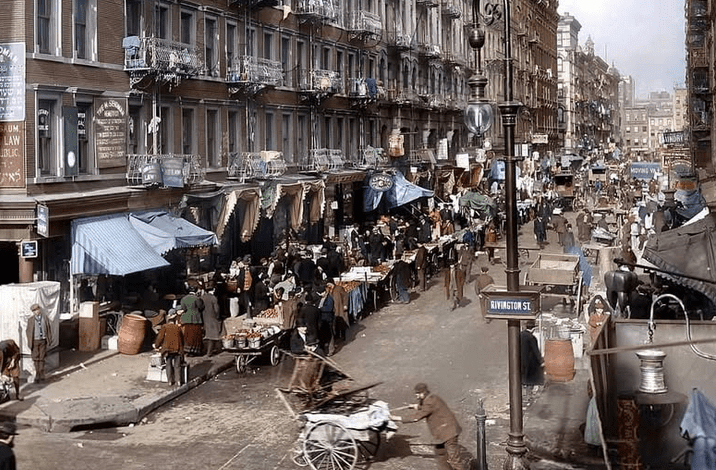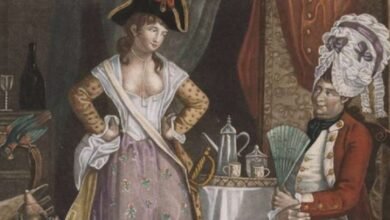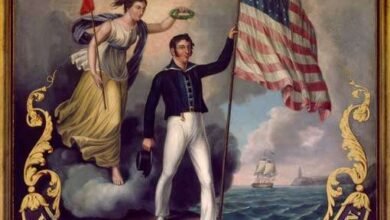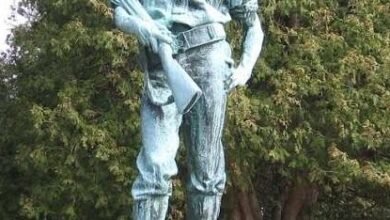Schmulka Bernstein: Everybody Eats – New York Almanack


 Schmulka Bernstein is standing on the sidewalk in front of the butcher store and smokehouse that bear his name, in the filtered grey sunlight that illuminates Rivington Street on Manhattan’s Lower East Side. I am standing next to him.
Schmulka Bernstein is standing on the sidewalk in front of the butcher store and smokehouse that bear his name, in the filtered grey sunlight that illuminates Rivington Street on Manhattan’s Lower East Side. I am standing next to him.
He is my grandfather, and he has asked me to accompany him. I am ten years old and pleased to be invited. In his right hand is a smallish, rumpled paper bag filled with birdseed.
The year is 1955. It must be a Sunday because this is when we usually make our way downtown from Queens to visit him and my grandmother.
Behind us, his name glows in neon capital letters three feet high, and below these a consumer can be assured that here “Kashruth is King and Quality Rules.” This testament is smaller but also in neon.
Standing here, he does not look like an important or notable person. He doesn’t look like someone whose name will outlive him by more than half a century, evoking, in those who know it feelings of both comfort and longing.
The writer and editor Morton Landowne recalled in a recent magazine article that, “an apocryphal, yet believable story is that a group of Yeshiva College students spending the year in Israel pooled their funds and dispatched one of their number to New York with explicit instructions to fill two suitcases with Schmulka’s food and then, without seeing or contacting a single family member, return to Israel on the next flight.”
He also does not look like any butcher you have read about in a novel or seen in a play. In literature, butchers, even kosher butchers, when they appear at all are inevitably described something like this:
“Reuben, like most butchers, was fat with a big stomach and a red neck. His throat was short and fleshy.”
That is a quote from the great novelist of East European Jewish life, Isaac Bashevis Singer. Who, despite his great love for his lost people, could never look kindly on meat eating. But this is not how Schmulka Bernstein understood his business.
Murals depicting scenes from Genesis decorated the wall of his butcher shop: Abraham at the opening to his tent, about to welcome the three strangers who are really angels. We see them in the distance. Then, Rebecca waiting by the well, followed by Joseph cast into the pit. Not great art, but good enough illustrations.
The painted tales give the store a hallowed aura: a place of koshering, as in following the holy commandments first laid out in Leviticus 11. A place where, just by standing in line waiting to choose your shoulder chops for dinner, you might be engaged in a sanctified activity.
Chuck roast, shoulder or brisket, Delmonico, steak cubed or rib, lamb chops, baby or shoulder. Our family loved them all and dined on the best cuts – two, three, four times a week. Red meat was essential, like the human need for water, air and fire.
The man I am standing beside on the sidewalk this morning is less than five feet tall, with small hands and slim fingers. Winter or summer he dresses the same. On his head, a grey fedora. On his person, a white butcher’s coat protects his business suit jacket and beneath those two garments a vest, a shirt, a tie so that he seems lost in his own clothes.
Green-tinted glasses shade his eyes, some treatment for glaucoma, and these add to the feeling that he is remote, unworldly.
But he is an American success story: noted and prosperous. In the family, we said ‘the Store,’ as people say, ‘the White House,’ meaning a significant marker, a one and only. But can a person be noted, prosperous and unworldly at the same time? It seems so.
Many Jewish immigrants came to him for advice or aid or a job; they came to him for donations and loans. I never saw this happening, but I was told. “They called him the Angel of Rivington Street,” Aunt Natalie said more than once over many years. “He brought people home so he, and your grandma of course, could feed them.”
Uncle Harry said, “He lent money to anyone who came to him: a rabbi, a stranger. They had to be recommended of course. He lent them money. He did not expect to be paid back. I wonder how many ever paid him back.
“He didn’t ask, my mother didn’t like that, though she gave too – to women. The women came to her. He just gave. Rabbi Levenson, the mashgiach, once estimated he gave away two-hundred and fifty thousand dollars. And that was a lot of money back then.”
I’ll say.
Schmulka Bernstein was bemused and gratified by American abundance. As an older man, at the beginning of each month, he would greet his Social Security retirement check with an incredulous laugh. “Free money, what a country!” Then he would scribble his endorsement on the back and hand it over to the bookkeeper for deposit with the business receipts.
His personal needs were modest. At home, which was then an apartment directly across the street from the store, he liked to watch Hopalong Cassidy movies on television.
Not for the plots or the romance, whose English he probably couldn’t follow, but because he liked to see herds of healthy cattle thunder across the Plains. Such bounty was so different from the meager farms of central Poland that he had known as a young man, in the early years of the twentieth century.
Uncle Harry, the fourth child and third son, who worked alongside his father in the business for twenty years, described it this way, “Your grandfather had, you might say, a cultural approach, not a business approach, not a modern approach. He wasn’t really interested in the American dream. Be religious, follow God’s will, take care of the Jewish people according to the Jewish law. That was his main concern.”
On this Sunday, when I am his companion, he tilts his head upward to scan the edge of the roof across the street. Then, he purses his lips in a shrill, moist whistle that I could never imitate no matter how many times he showed me how to do it. As he whistles, he is already throwing grain and seed onto the sidewalk from his wrinkled paper bag.
A few pigeons flutter to the pavement at our feet, as if they had been waiting for his call. Then more, maybe twenty, then thirty. They form a semi-circle around us. Clucking struts and manic pecking as my grandfather tosses out the food. On the perimeter, sparrows and starlings hop up and down hopefully. With the wide arc of his arm, Schmulka Bernstein makes sure that these little brown and black outliers also get their share.
While his business motto is: “Where Kashruth is King and Quality Rules,” his personal motto, if he had one, would be more succinct and universal: “Everybody eats.”
It is illegal to feed pigeons in New York City. Across the street a policeman walks by, notices the flocking birds, sees us encouraging them. He crosses over. A towering, large-headed figure, he knows the ticket he starts to write will not stop the old man. A game they play, each following his chosen profession. From beneath the brim of his grey fedora, my grandfather peers up at the guardian of law and order and gives a small, crooked smile: “Feeding the hungry is a problem?”
Later in the week one of my uncles will walk over to the police station to pay the fine. Fee after fee. Every penalty was paid. Everybody eats.
Michele Clark is retired from teaching in the graduate program of Goddard College. She has written and published personal essays about Jewish themes for small magazines and academic journals. She lives in Plainfield, Vermont.
Photo: Jewish community along Rivington Street on the Lower East Side, Manhattan, New York City, 1909 (colorized) view from the corner of Rivington and Orchard, looking north.
Source link




